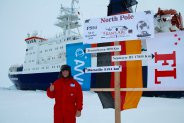Pollution
Marine Biodiversity
Toxic Pollutants & Hazardous Substances
Water Quality
Fisheries
Algae & Plankton
Post-Doctoral Fellowships
France
2015.06.30
Mercury’s Mysteries in the Arctic Ocean
Life at the top of the food chain has its benefits, but distinct drawbacks, too. Pollutants ingested by smaller creatures become concentrated in the animals that prey on them, and so on, all the way up the chain. Mercury—specifically, its most toxic form, methylmercury—accumulates this way in certain fish we eat. Exposure is harmful to the nervous system and for fetal development. This much is known, but questions remain about where the mercury in the ocean is coming from and how it is transformed into its more dangerous version, methylmercury, in the first place. Dr. Lars-Eric Heimbürger is working hard to address these points for the central Arctic Ocean. He is the first researcher to focus on different mercury species present in the water, versus the air, and his results today may help predict the effect of climate change on the oceanic mercury cycle tomorrow.
Emissions from human activities, like burning coal, are responsible for some of the mercury that ends up deposited in the waters of the far North. However, recent research has shown that atmospheric sources cannot account for it all. Dr. Heimbürger is now investigating how much mercury Siberian rivers might carry into the Arctic Ocean, especially during the spring flood season. The next question is how and where the fateful transformation to methylmercury occurs. One hypothesis is that some abyssal bacteria known to produce such a chemical change are ingesting mercury along with the sinking marine snow they eat. Dr. Heimbürger’s studies of this mechanism in Arctic seawater will be another piece in the complex Arctic mercury puzzle, and hopefully contribute to solving it.
He will further pin down the dynamics of the mercury cycle through a combination of several Arctic Ocean cruises on the icebreaker Polarstern (1), field observations during Siberian river spring floods and dedicated lab experiments. He is measuring how methylmercury levels change across the Arctic from day to day, and down to depths of several kilometers. This will allow him to map out its presence, providing important tools for the fishing industry, too, to identify the safest zones from which to take their catch. The results may also help predict how warmer conditions, melting sea ice, and algae growth will impact bacterial methylmercury production. Understanding these elements is the only way to confront the significant risk to health and our food supply posed by methylmercury pollution. With Dr. Heimbürger’s results, we can hope to minimize the consequences, both human and economic, by keeping our fish safe to eat.
(1) Operated by the Alfred Wegener Institute for Polar Research
Scientific title: Levering Knowledge Gaps To Understand And Anticipate Risk From Methylmercury Exposure
To add or modify information on this page, please contact us at the following address: community.research@axa.com

Lars-Eric
HEIMBURGER
Institution
Aix-Marseille Université
Country
France
Nationality
German
Related articles
Pollution
Sustainable Living & City
Chronic & Non Communicable Diseases
Air Quality
Urban Planning
Smart Cities
Respiratory Diseases
AXA Outreach
Spain
RI-URBANS
Urban areas face increasing challenges related to air pollution, impacting public health and quality of life. The ‘Air Quality in... Read more

Fulvio
AMATO
Spanish National Research Council
Climate Change
Marine Biodiversity
Sustainable Living & City
Nature-based Solutions
Sea-level Rise & Erosion
Coastal Living
Climate Adaptation & Resilience
AXA Award
Germany
2024.12.01
Greening The Blue Economy
Dr. Goseberg's work involves identifying and defining nature-based solutions to protect natural coastlines from severe weather events and rising sea... Read more
Nils
GOSEBERG
